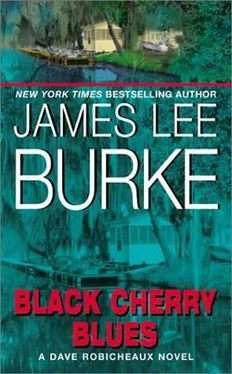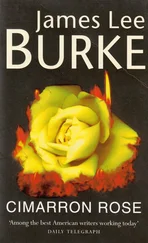
James Lee Burke
Black Cherry Blues
The third book in the Dave Robicheaux series
For John and Flavia McBride
I would like to thank the John Simon Guggenheim Foundation for its generous assistance, and I also would like to thank the National Endowment for the Arts for its past support.
Her hair is curly and gold on the pillow, her skin white in the heat lightning that trembles beyond the pecan trees outside the bedroom window. The night is hot and breathless, the clouds painted like horsetails against the sky; a peal of thunder rumbles out on the Gulf like an apple rolling around in the bottom of a wood barrel, and the first raindrops ping against the window fan. She sleeps on her side, and the sheet molds her thigh, the curve of her hip, her breast. In the flicker of the heat lightning the sun freckles on her bare shoulder look like brown flaws in sculpted marble.
Then a prizing bar splinters the front door out of the jamb, and two men burst inside the house in heavy shoes, their pump shotguns at port arms. One is a tall Haitian, the other a Latin whose hair hangs off his head in oiled ringlets. They stand at the foot of the double bed in which she sleeps alone, and do not speak. She awakes with her mouth open, her eyes wide and empty of meaning. Her face is still warm from a dream, and she cannot separate sleep from the two men who stare at her without speaking. Then she sees them looking at each other and aim their shotguns point-blank at her chest. Her eyes film and she calls out my name like a wet bubble bursting in her throat.
The sheet is twisted in her hands; she holds it against her breasts as though it could protect her from twelve-gauge deer slugs and double-aught buckshot.
They begin shooting, and the room seems to explode with smoke and flame from their shotgun barrels, with shell wadding, mattress stuffing, splinters gouged out of the bedstead, torn lampshades, flying glass. The two killers are methodical. They have taken out the sportsman's plug in their shotguns so they can load five rounds in the magazine, and they keep firing and ejecting the smoking hulls on the floor until their firing pins snap empty. Then they reload with the calmness of men who might have just stood up in a blind and fired at a formation of ducks overhead.
The sheet is torn, drenched with her blood, embedded in her wounds. The men have gone now, and I sink to my knees by my wife and kiss her sightless eyes, run my hands over her hair and wan face, put her fingers in my mouth. A solitary drop of her blood runs down the shattered headboard and pools on my skin. A bolt of lightning explodes in an empty field behind the house. The inside of my head is filled with a wet, sulphurous smell, and again I hear my name rise like muffled, trapped air released from the sandy bottom of a pond.
It was four in the morning on a Saturday and raining hard when I awoke from the dream in a West Baton Rouge motel. I sat on the side of the bed in my underwear and tried to rub the dream out of my face, then I used the bathroom and came back and sat on the side of the bed again in the dark.
First light was still two hours away, but I knew I would not sleep again. I put on my raincoat and hat and drove in my pickup truck to an all-night cafe that occupied one side of a clapboard roadhouse. The rain clattered on my truck cab, and the wind was blowing strong out of the southwest, across the Atchafalaya swamp, whipping the palm and oak trees by the highway. West Baton Rouge, which begins at the Mississippi River, has always been a seedy area of truck stops, marginal gambling joints, Negro and blue-collar bars. To the east you can see the lighted girders of the Earl K. Long Bridge, plumes of smoke rising from the oil refineries, the state capitol building silhouetted in the rain. Baton Rouge is a green town full of oak trees, parks, and lakes, and the thousands of lights on the refineries and chemical plants are regarded as a testimony to financial security rather than a sign of industrial blight. But once you drive west across the metal grid of the bridge and thump down on the old cracked four-lane, you're in a world that caters to the people of the Atchafalaya basin Cajuns, red bones roustabouts, pipe lingers rednecks whose shrinking piece of American geography is identified only by a battered pickup, a tape deck playing Waylon, and a twelve-pack of Jax.
The rain spun in the yellow arc lights over the cafe parking lot. It was empty inside, except for a fat Negro woman whom I could see through the service window in the kitchen, and a pretty, redheaded waitress in her early twenties, dressed in a pink uniform with her hair tied up on her freckled neck. She was obviously tired, but she was polite and smiled at me when she took my order, and I felt a sense of guilt, almost shame, at my susceptibility and easy fondness for a young woman's smile. Because if you're forty-nine and unmarried or a widower or if you've simply chosen to live alone, you're easily flattered by a young woman's seeming attention to you, and you forget that it is often simply a deference to your age.
I ordered a chicken-fried steak and a cup of coffee and listened to Jimmy Clanton's recording of "Just a Dream" that came from the jukebox next door. Through the open doorway that gave onto the empty dance floor, I could see a half-dozen people at the bar against the far wall. I watched a man my age, with waved blond hair, drink his whiskey down to the ice, point to the glass for the bartender to refill it, then rise from his stool and walk across the dance floor into the cafe.
He wore gray slacks, a green sport shirt with blue flowers on it, shined loafers, white socks, a gold watch, and gold clip-on ballpoint pens in his shirt pocket. He wore his shirt outside his slacks to hide his paunch and love handles.
"Hey, hon, let me have a cheeseburger and bring it up to the bar, will you?" he said.
Then his eyes adjusted to the light and he looked at me more carefully.
"Great God Almighty," he said.
"Dave Robicheaux. You son of a buck."
A voice and a face out of the past, not simply mine but from an era. Dixie Lee Pugh, my freshman roommate at Southwestern Louisiana Institute in 1956: a pecker wood kid from a river town north of Baton Rouge, with an accent more Mississippi than Louisiana, who flunked out his first semester, then went to Memphis and cut ajUk two records at the same studio where Carl Perkins, Johnny Cash, and Elvis began their careers. The second record put him on New York television, and we watched in awe while he played his sunburst rhythm-and-blues guitar or hammered his fingers on the piano keyboard while an audience of thousands went insane and danced in the aisles.
He was one of the biggest in the early rock 'n' roll era. But he had something more going for him than many of the others did. He was the real article, an honest-to-God white blues singer. He learned his music in the Baptist church, but somebody in that little cotton and pecan-orchard town rubbed a lot of pain into him, too, because it was in everything he sang and it wasn't manufactured for the moment, either.
Then we read and heard other stories about him: the four or five failed marriages, the death of one of his children in a fire, a hit-and-run accident and DWI in Texas that put him in Huntsville pen.
"Dave, I don't believe it," he said, grinning.
"I saw you ten or twelve years ago in New Orleans. You were a cop."
I remembered it. It had been in a low-rent bar off Canal, the kind of place that featured yesterday's celebrities, where the clientele made noise during the performances and insulted the entertainers.
Читать дальше













